Summary of Findings
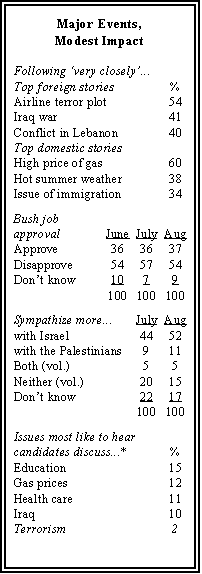 The public is paying a great deal of attention to major overseas events – the reported terrorist plot against U.S. trans-Atlantic jet liners, the war in Lebanon, as well as the ongoing violence in Iraq. However, there is little indication that these dramatic stories have materially changed public attitudes. Worries about another terrorist attack have not surged. The public continues to express high levels of support for Israel, even as a sizable minority views Israel as mostly responsible for the civilian casualties arising from the fighting. And while more Americans say the U.S. is losing ground in preventing a civil war in Iraq, basic attitudes about the conflict are largely unchanged.
The public is paying a great deal of attention to major overseas events – the reported terrorist plot against U.S. trans-Atlantic jet liners, the war in Lebanon, as well as the ongoing violence in Iraq. However, there is little indication that these dramatic stories have materially changed public attitudes. Worries about another terrorist attack have not surged. The public continues to express high levels of support for Israel, even as a sizable minority views Israel as mostly responsible for the civilian casualties arising from the fighting. And while more Americans say the U.S. is losing ground in preventing a civil war in Iraq, basic attitudes about the conflict are largely unchanged.
The strong focus on news from abroad is having little impact on the public’s political opinions. President Bush’s job approval rating stands at 37%, virtually unchanged from July. His personal image continues to be far less positive than it was about a year ago about half the public says he is not a strong leader, not trustworthy, and unable to get things done. Moreover, the renewed emphasis on terrorism has done little to boost the president’s standing on that issue. The survey, which was largely conducted after the Aug. 10 revelations of the terror plot against airliners, shows that 50% approve of the president’s handling of terrorist threats, little changed from June (47%).
The severity of the president’s image problem is reflected in the fact that while many Americans (49%) feel the level of U.S. involvement in resolving the Lebanon crisis has been appropriate, far fewer (36%) say they approve of Bush’s handling of the issue.
 Attitudes toward the midterm congressional campaign also remain fairly stable, with strong anti-incumbent sentiment persisting and the Democrats retaining a sizable advantage in voting intentions. There is no evidence that terrorism is weighing heavily on voters just 2% cite that as the issue they most want to hear candidates discuss, far fewer than the number mentioning education, gas prices, or health care. And while roughly a third of Americans (35%) say they are very concerned that, if Democrats gain control of Congress, they will weaken terrorist defenses, even more (46%) express great concern that Republicans will involve the U.S. in too many overseas military missions if the GOP keeps its congressional majorities.
Attitudes toward the midterm congressional campaign also remain fairly stable, with strong anti-incumbent sentiment persisting and the Democrats retaining a sizable advantage in voting intentions. There is no evidence that terrorism is weighing heavily on voters just 2% cite that as the issue they most want to hear candidates discuss, far fewer than the number mentioning education, gas prices, or health care. And while roughly a third of Americans (35%) say they are very concerned that, if Democrats gain control of Congress, they will weaken terrorist defenses, even more (46%) express great concern that Republicans will involve the U.S. in too many overseas military missions if the GOP keeps its congressional majorities.
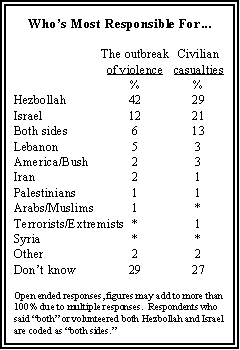 The latest national survey by the Pew Research Center for the People & the Press, conducted Aug. 9-13 among 1,506 adults, finds a continuing partisan split in views of whether U.S. forces should be brought home from Iraq as soon as possible, or be kept in the country until the situation has stabilized. However, there also are notable internal Republican divisions over the question of a troop withdrawal. About twice as many moderate and liberal Republicans as conservative Republicans favor bringing U.S. troops home as soon as possible (35% vs. 18%). By contrast, Democrats are comparatively unified across ideological lines over whether to withdraw U.S. forces as quickly as possible; 66% of conservative and moderate Democrats favor this course, as do 62% of liberals.
The latest national survey by the Pew Research Center for the People & the Press, conducted Aug. 9-13 among 1,506 adults, finds a continuing partisan split in views of whether U.S. forces should be brought home from Iraq as soon as possible, or be kept in the country until the situation has stabilized. However, there also are notable internal Republican divisions over the question of a troop withdrawal. About twice as many moderate and liberal Republicans as conservative Republicans favor bringing U.S. troops home as soon as possible (35% vs. 18%). By contrast, Democrats are comparatively unified across ideological lines over whether to withdraw U.S. forces as quickly as possible; 66% of conservative and moderate Democrats favor this course, as do 62% of liberals.
The survey shows that overall public support for Israel is, if anything, even greater than it was before its cross-border offensive against Hezbollah militants. Indeed, 52% now say they sympathize with Israel in its dispute with the Palestinians, a significant increase from July (44%). As far as the situation in Lebanon itself, more than three times as many people blame Hezbollah for the outbreak of violence there than blame Israel (by 42% to 12%).
Overwhelmingly, Americans see Hezbollah as a group that is committed to Israel’s destruction. Fully 63% express this view, compared with just 15% who think Hezbollah is a group with which Israel might be able to reach an accommodation. Consequently, a plurality of Americans feel that Israel’s response to the conflict has been appropriate, although 21% think that Israel has been most responsible for the civilian casualties that have occurred. Only somewhat more (29%) place most of the blame for civilian casualties on Hezbollah.
The conflict in Lebanon has attracted unusually high public interest for an overseas story that does not directly involve the United States or Americans. Four-in-ten Americans say they are following the conflict very closely, about the same number as are paying very close attention to the situation in Iraq (41%). Still, considerably more say they followed news of the terror plot against airlines very closely (54%), while an even higher percentage say they followed the high price of gasoline very closely (60%).
 Generally, the public gives good grades to press coverage of the conflict 61% feel it has been fair, while a 47% plurality says the amount of coverage has been appropriate. Despite the widespread interest in news about Lebanon, however, most Americans feel they do not have a very good understanding of the political situation in the Middle East. When asked which current news story they wished they understood better, more volunteered the Lebanon crisis than any other story.
Generally, the public gives good grades to press coverage of the conflict 61% feel it has been fair, while a 47% plurality says the amount of coverage has been appropriate. Despite the widespread interest in news about Lebanon, however, most Americans feel they do not have a very good understanding of the political situation in the Middle East. When asked which current news story they wished they understood better, more volunteered the Lebanon crisis than any other story.
Regarding the public’s awareness of current news stories, most Americans were able to correctly name the Hollywood actor who recently made anti-Semitic remarks during a drunk driving arrest (69%); Mel Gibson was widely identified despite the fact that just 14% say they followed his outburst very closely. Far fewer Americans (40%) were able to name the Democratic senator who this month lost a primary election in Connecticut (Joe Lieberman). And roughly a third (35%) could identify Katie Couric as the soon-to-be anchor of the CBS Evening News.
Terror Plot: Broad Attention, No Spike in Concern
The news that British officials had stopped a terrorist plot to blow up planes flying to the U.S. drew higher public attention than have most other terror-related news stories since the Sept. 11, 2001 attacks. Fully 54% say they followed this news story very closely, compared with 48% who tracked last summer’s London bombings very closely, and 34% who paid close attention to the Madrid rail bombings in 2004.
 The extensive public attention did not result in a spike in concern about terrorism, however. In interviews conducted after the story broke (Aug. 10-13), a quarter of respondents said that they were “very worried” that there will soon be another terrorist attack on the United States. By comparison, 17% of respondents interviewed on Aug. 9 before the announcement reported that level of concern. This small rise in public concern is similar to those measured in previous terrorist events. In the wake of last summer’s London bombings 26% of Americans expressed high concern about terrorism hitting the U.S., up from 17% in late 2004. And the 2004 Madrid bombings caused a similar seven-point jump in terrorism concern, from 13% before the bombings to 20% after.
The extensive public attention did not result in a spike in concern about terrorism, however. In interviews conducted after the story broke (Aug. 10-13), a quarter of respondents said that they were “very worried” that there will soon be another terrorist attack on the United States. By comparison, 17% of respondents interviewed on Aug. 9 before the announcement reported that level of concern. This small rise in public concern is similar to those measured in previous terrorist events. In the wake of last summer’s London bombings 26% of Americans expressed high concern about terrorism hitting the U.S., up from 17% in late 2004. And the 2004 Madrid bombings caused a similar seven-point jump in terrorism concern, from 13% before the bombings to 20% after.
More Pessimism on Iraq
After an uptick in optimism two months ago following the death of insurgent leader Abu Musab al-Zarqawi, the public has become significantly more pessimistic about the situation in Iraq. But basic attitudes about the decision to go to war and what to do at this point remain stable. As in the past, both perceptions of progress and opinions about what to do remain highly polarized along partisan lines. Ideological divisions on what to do about the war are significantly greater within the Republican Party than in the Democratic Party.
 The public divides evenly on the question of whether the decision to use military force in Iraq was right (45%) or wrong (46%) and on whether to keep troops there until a stable government is established (48%) or bring troops home as soon as possible (46%). Opinion on both of these questions has changed little during 2006, and reflect a basic division on the war that emerged during 2005.
The public divides evenly on the question of whether the decision to use military force in Iraq was right (45%) or wrong (46%) and on whether to keep troops there until a stable government is established (48%) or bring troops home as soon as possible (46%). Opinion on both of these questions has changed little during 2006, and reflect a basic division on the war that emerged during 2005.
There has also been little change in the level of support for a timetable for withdrawing troops from Iraq: 52% say there should be timetable, 41% say there should not, a division virtually identical to that seen since mid-July of 2005.
What has changed are views of the situation on the ground in Iraq. Currently 55% of those polled say the U.S. military effort is going “not too well” or “not at all well.” This is the highest negative percentage expressed in Pew’s polls since the start of the war in 2003. This general assessment of the situation is also reflected in growing pessimism about the eventual outcome of the conflict. Currently, 47% say that the U.S. will definitely (12%) or probably (35%) succeed in establishing a stable democracy in Iraq, the lowest number expressing this view since the question was first asked in mid-2005. When asked a slightly different version of this question whether the U.S. will succeed “in achieving its goal in Iraq,” the public is slightly more optimistic, 54% expecting success.
Losing Ground in Preventing Civil War
 The optimism generated by the killing of Zarqawi in June has largely dissipated, especially with regard to the U.S.’s key objectives. Since then, the number of Americans who say that we are losing ground in defeating the insurgents has risen by nine percentage points (from 36% to 45%), and there has been an even larger increase in the percentage saying that we are losing ground in preventing a civil war between various religious and ethnic groups (from 50% to 63%). There is also notably more pessimism about coalition efforts to rebuild Iraqi infrastructure (from 23% “losing ground” to 34%), and less optimism about the progress in establishing democracy in Iraq (from 55% “making progress” to 47%).
The optimism generated by the killing of Zarqawi in June has largely dissipated, especially with regard to the U.S.’s key objectives. Since then, the number of Americans who say that we are losing ground in defeating the insurgents has risen by nine percentage points (from 36% to 45%), and there has been an even larger increase in the percentage saying that we are losing ground in preventing a civil war between various religious and ethnic groups (from 50% to 63%). There is also notably more pessimism about coalition efforts to rebuild Iraqi infrastructure (from 23% “losing ground” to 34%), and less optimism about the progress in establishing democracy in Iraq (from 55% “making progress” to 47%).
Other measures show less change. About the same numbers today as two months ago say we are making progress in reducing Iraqi civilian casualties (25% now, 29% in June) and in preventing terrorists from using Iraq as a base for attacks against the U.S. and its allies (45% now, 49% in June). The public remains most optimistic about efforts to train Iraqi security forces: 58% currently say we are making progress, which is about the same as in June (61%).
Perceptions about progress continue to be nearly as polarized by party affiliation as perceptions about what should be done in Iraq. On every question, Republicans are substantially more upbeat than Democrats. The smallest partisan gap in views of progress is 21 percentage points (reducing civilian casualties, where both parties are relatively glum). Sizable majorities of Republicans (about two-thirds to three-fourths) see progress in all areas except preventing a civil war and reducing civilian casualties, though Republican optimism on preventing civil war dropped by 16 percentage points in two months. By contrast, in none of these areas does a majority of Democrats see progress.
On all of the items, independents are closer to the Democrats than to the Republicans in their views of how things are going. Only on the matter of training Iraqi forces does a majority of independents (57%) see the U.S. as making progress.
 Divisions Within the Parties on Iraq
Divisions Within the Parties on Iraq
The defeat of Sen. Joseph Lieberman by Ned Lamont in the Connecticut Democratic senatorial primary last week raised anew the question of divisions within the Democratic Party over the war in Iraq. Lieberman’s support for the war in Iraq was a major factor in his defeat, according to pre-election and exit polls conducted in the race.
While most Republicans support the war and most Democrats oppose it, views within the parties are not unanimous. This is especially true regarding the critical question of what should be done now about the U.S. involvement. Among Republicans, 72% say the U.S. should keep troops in Iraq until the situation has stabilized; among Democrats, 65% favor bringing troops home as soon as possible. But while there is slightly greater agreement within the GOP in support of the president’s policy than there is in opposition to it within the Democratic Party, divisions along ideological lines are much greater in the Republican than the Democratic Party.
Among Democrats, comparable levels of support for bringing the troops home are found among liberal Democrats (62%) and among those who consider themselves moderate or conservative (66%). And among both groups, bringing the troops home is more likely to mean a gradual withdrawal (45% among moderate and conservative Democrats, 42% among liberal Democrats) within the next 1-2 years rather than an immediate pullout.
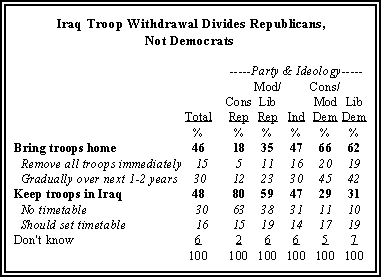 By contrast, there is a sizable gap on this question between conservative Republicans and their moderate to liberal colleagues. Eight-in-ten conservative Republicans favor keeping troops in Iraq; among moderate and liberal Republicans, 59% agree. And the GOP division is even more pronounced when the question of a timetable for withdrawing troops is also considered. Nearly two-thirds of conservative Republicans (63%) say the troops should stay in Iraq until things stabilize and that there should be no timetable for withdrawal. But just 38% of moderate and liberal Republicans agree with this position, which best approximates the position of the Bush administration.
By contrast, there is a sizable gap on this question between conservative Republicans and their moderate to liberal colleagues. Eight-in-ten conservative Republicans favor keeping troops in Iraq; among moderate and liberal Republicans, 59% agree. And the GOP division is even more pronounced when the question of a timetable for withdrawing troops is also considered. Nearly two-thirds of conservative Republicans (63%) say the troops should stay in Iraq until things stabilize and that there should be no timetable for withdrawal. But just 38% of moderate and liberal Republicans agree with this position, which best approximates the position of the Bush administration.
Public Sympathy for Israel Grows
Despite some concerns over the extent of Israel’s bombing campaign in Lebanon, the American public remains sympathetic with Israel’s position both in this conflict and more generally. In fact, the proportion favoring Israel’s side in the long-running conflict between Israel and the Palestinians has increased since before the current conflict started. Currently, 52% say they sympathize more with Israel’s position in that conflict, up from 44% a month ago.
By a margin of 40% to 8%, more Americans say the U.S. should publicly support, not publicly criticize, Israel over its response to the current situation in southern Lebanon virtually unchanged from a CBS/New York Times survey taken in the early stages of the conflict. Fully 44% believe that Israel’s response to Hezbollah militants has been appropriate, and another 15% say that Israel has not gone far enough. There is a 23% minority, however, who believe that Israel has gone too far.
 In large part, the public’s support for Israel is rooted in a sense that Hezbollah is responsible for initiating the current crisis, and that it is a group that Israel simply cannot negotiate with. Fully 42% of Americans say that Hezbollah is most responsible for the outbreak of the recent violence, another 5% cite Lebanon, and a few others point to Iran, the Palestinians, or Muslims in general. By comparison, just 12% say that Israel bears the most responsibility for the current conflict.
In large part, the public’s support for Israel is rooted in a sense that Hezbollah is responsible for initiating the current crisis, and that it is a group that Israel simply cannot negotiate with. Fully 42% of Americans say that Hezbollah is most responsible for the outbreak of the recent violence, another 5% cite Lebanon, and a few others point to Iran, the Palestinians, or Muslims in general. By comparison, just 12% say that Israel bears the most responsibility for the current conflict.
In addition, 63% of Americans believe that Hezbollah is a group committed to the destruction of Israel, while just 15% believe it is a group that Israel might be able to reach an accommodation with. And the more people follow the news or feel informed about the situation, the more widely they perceive Hezbollah as a group Israel cannot negotiate with at all.
But backing for Israel is hardly universal, particularly as it relates to civilian casualties since the fighting began. Americans overwhelmingly blame Hezbollah for initiating the conflict, they are more divided over who is to blame for civilian casualties 29% hold Hezbollah responsible but 21% say Israel is responsible and another 13% blame both sides equally. Overall, 45% register approval of Israel’s military action in Lebanon, 33% disapprove.
Mideast Views More Partisan
 Americans’ views of the Israel-Palestinian conflict have grown more partisan since the 1990s. Currently, 68% of Republicans say they sympathize more with Israel than the Palestinians, compared with 49% of independents and just 45% of Democrats. While support for Israel has grown among members of both parties and especially independents since July of this year, the partisan differences have not changed.
Americans’ views of the Israel-Palestinian conflict have grown more partisan since the 1990s. Currently, 68% of Republicans say they sympathize more with Israel than the Palestinians, compared with 49% of independents and just 45% of Democrats. While support for Israel has grown among members of both parties and especially independents since July of this year, the partisan differences have not changed.
The partisan gap in opinions of the Israel-Palestinian conflict has widened since the Clinton administration, largely because Republicans have grown much more supportive of Israel. In September 1997, for instance, 55% of Republicans and 48% of Democrats said they had greater sympathy for Israel than the Palestinians.
What Should America Do?
 In general, Americans either are comfortable with the level of U.S. involvement in the Israel/Hezbollah conflict, or worry that the U.S. is already too involved. While 40% want the U.S. to publicly support Israel, nearly as many (38%) think that the U.S. should say or do nothing in terms of either backing or criticizing Israel. A 49% plurality says the U.S. is as involved as it should be in terms of resolving the conflict, and among those who disagree there is far more sentiment that the U.S. is too involved (28%) than not involved enough (15%).
In general, Americans either are comfortable with the level of U.S. involvement in the Israel/Hezbollah conflict, or worry that the U.S. is already too involved. While 40% want the U.S. to publicly support Israel, nearly as many (38%) think that the U.S. should say or do nothing in terms of either backing or criticizing Israel. A 49% plurality says the U.S. is as involved as it should be in terms of resolving the conflict, and among those who disagree there is far more sentiment that the U.S. is too involved (28%) than not involved enough (15%).
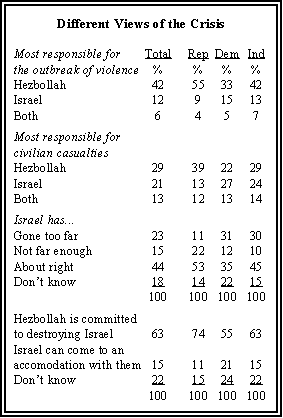 Democrats are the most likely group to favor less U.S. involvement in the conflict 44% say the U.S. should say or do nothing in the conflict, and 36% say the U.S. should be less involved than it is now. Part of this reflects Democratic disapproval of the President and his foreign policy leadership, but it also reflects the partisan divide in sympathy for Israel.
Democrats are the most likely group to favor less U.S. involvement in the conflict 44% say the U.S. should say or do nothing in the conflict, and 36% say the U.S. should be less involved than it is now. Part of this reflects Democratic disapproval of the President and his foreign policy leadership, but it also reflects the partisan divide in sympathy for Israel.
As a result, Republicans are far more likely to hold Hezbollah responsible for both starting the conflict and contributing to the casualties, and to perceive it as a group that is set on the destruction of Israel. By comparison, Democratic views on the crisis are less uniform. For example, most Republicans (53%) believe Israel’s actions have been about right, while just 11% believe they have gone too far. Democrats are divided on this question, with only about a third (35%) saying Israel’s actions have been appropriate and another third (31%) saying they have gone too far.
These partisan divides are even more striking among those paying very close attention to news from the Middle East. Republicans who are tracking the news very closely are overwhelmingly supportive of Israel, and place the blame squarely on Hezbollah for the current violence and casualties. Democrats who are tracking the news very closely are not behind Hezbollah by any stretch, but are far more critical of Israel’s actions in the current conflict and the most supportive of the United States doing more to help resolve the situation.
Good Marks for Press Coverage
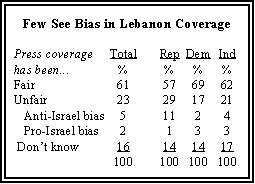 The press receives generally favorable marks for its coverage of the Israel/Hezbollah conflict. Nearly half (47%) say the amount of coverage has been appropriate; among those critical of the level of coverage, more say the press has given too much attention to the story (29%) than too little (16%). By more than two-to-one (61% vs 23%), the public also believes that press coverage of the conflict has been fair.
The press receives generally favorable marks for its coverage of the Israel/Hezbollah conflict. Nearly half (47%) say the amount of coverage has been appropriate; among those critical of the level of coverage, more say the press has given too much attention to the story (29%) than too little (16%). By more than two-to-one (61% vs 23%), the public also believes that press coverage of the conflict has been fair.
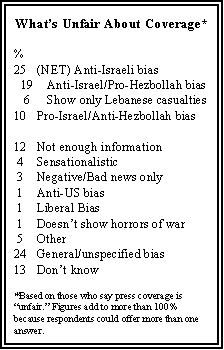 Republicans are more likely than Democrats and independents to see a slant in news coverage of the current conflict, and are by far the most likely to say that bias is against Israel. Roughly one-in-ten Republicans (11%) say that the press coverage is either biased against Israel and in favor of Hezbollah, or is focused unduly on Lebanese casualties without enough attention on damage in Israel. These are criticisms raised very rarely by Democrats or independents. Overall, 5% of Americans believe press coverage has been biased against Israel, while just 2% perceives a pro-Israel bias to media coverage of the conflict.
Republicans are more likely than Democrats and independents to see a slant in news coverage of the current conflict, and are by far the most likely to say that bias is against Israel. Roughly one-in-ten Republicans (11%) say that the press coverage is either biased against Israel and in favor of Hezbollah, or is focused unduly on Lebanese casualties without enough attention on damage in Israel. These are criticisms raised very rarely by Democrats or independents. Overall, 5% of Americans believe press coverage has been biased against Israel, while just 2% perceives a pro-Israel bias to media coverage of the conflict.
Overall, many of those who say the press coverage has been unfair don’t have a political bias in mind. While about a third who say the coverage is unfair point to either an anti-Israel (25%) or anti-Hezbollah (10%) slant to the coverage, another 12% say the unfairness is just that the press is not offering enough information to viewers, readers and listeners.
Democrats’ Midterm Advantage
 Voters continue to say they favor the Democratic candidate in their district, currently by a 50% to 41% margin. This reflects overwhelming loyalty among both Democrats and Republicans, combined with the fact that independent voters currently favor the Democratic candidate in their district by a 48% to 34% margin.
Voters continue to say they favor the Democratic candidate in their district, currently by a 50% to 41% margin. This reflects overwhelming loyalty among both Democrats and Republicans, combined with the fact that independent voters currently favor the Democratic candidate in their district by a 48% to 34% margin.
Anti-incumbent sentiment remains remarkably high. Three-in-ten say they do not want the representative in their district to be reelected, largely unchanged from surveys earlier this year and significantly more than expressed this view in the 2002 or 1998 midterms. In recent years, only polling on the eve of the 1994 midterm election registered this level of anti-incumbent voting.
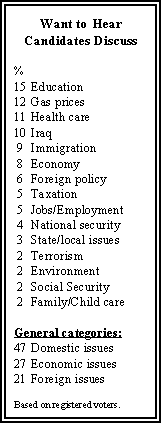 Views on the overall makeup of Congress have moderated somewhat since June. Today, 49% say they would like to see most members of Congress replaced in this election, down slightly from 57% two months ago. Even with this small drop, however, there is greater antagonism toward incumbents generally than in any midterm since 1994.
Views on the overall makeup of Congress have moderated somewhat since June. Today, 49% say they would like to see most members of Congress replaced in this election, down slightly from 57% two months ago. Even with this small drop, however, there is greater antagonism toward incumbents generally than in any midterm since 1994.
While foreign policy has dominated the news recently, most voters want to hear midterm candidates address domestic issues on the campaign trail this fall. Only one-in-five voters (21%) mention issues related to foreign policy, Iraq or the war on terrorism as what they want candidates to discuss. Instead, a wide range of domestic issues are frequently mentioned, including education (15%), gas prices (12%), health care (11%), and immigration (9%).
But while the focus is domestic, it is not entirely on the economy just 8% cite the economy directly as the issue they most want candidates to talk about in the closing days of the 2002 midterm fully 40% cited the economy as the pre-eminent campaign issue.
And equally important, even with most of the polling conducted after the British arrests in a possible terrorist plot, just 2% cite terrorism as the issue candidates most need to address this fall.
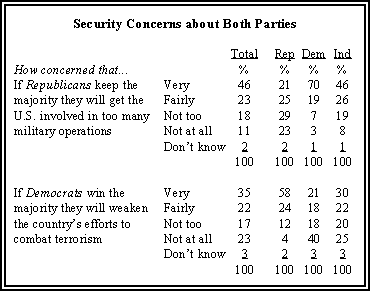 While a low priority, the implications of the terrorism issue for midterm candidates are clearly mixed, with potential downsides for both Democrats and Republicans. In particular, while many Americans express concern about the Democrats’ capacity to carry out the war on terrorism if they win a majority this fall, there is greater concern about Republicans involving the U.S. in too many overseas military operations if they retain power after the election.
While a low priority, the implications of the terrorism issue for midterm candidates are clearly mixed, with potential downsides for both Democrats and Republicans. In particular, while many Americans express concern about the Democrats’ capacity to carry out the war on terrorism if they win a majority this fall, there is greater concern about Republicans involving the U.S. in too many overseas military operations if they retain power after the election.
Fully 46% of Americans say they are very concerned that if Republicans keep control of the Congress this fall they will get the country involved in too many military missions. By comparison, just over a third (35%) say they are very concerned that if Democrats take control of the Congress this fall they will weaken the country’s efforts to combat terrorism.
The concerns of independents are potentially the most relevant, and decidedly unfavorable to Republican candidates. Fully 72% of independents say they are very or fairly concerned about where a Republican majority would steer U.S. foreign policy. Just 52% of independents are equally concerned that a Democratic majority would be too weak on terrorism.
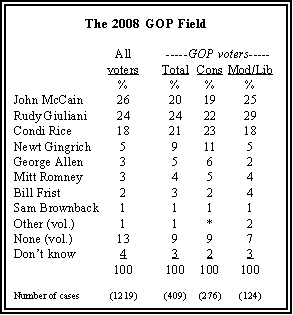 But foreign affairs is not the only issue that is causing problems for GOP candidates among independent voters. While independents who are concerned about Republican overassertiveness favor Democratic candidates this fall by wide margins, Republican candidates are barely breaking even among independents who do not hold this view. Independents are more likely to cite gas prices than terrorism or foreign policy as the issue they most want to hear candidates discuss this fall.
But foreign affairs is not the only issue that is causing problems for GOP candidates among independent voters. While independents who are concerned about Republican overassertiveness favor Democratic candidates this fall by wide margins, Republican candidates are barely breaking even among independents who do not hold this view. Independents are more likely to cite gas prices than terrorism or foreign policy as the issue they most want to hear candidates discuss this fall.
Early Look at ’08
With two years to go before the presidential campaign, Sen. John McCain and former New York City mayor Rudy Giuliani are the front-runners for the Republican nomination. Overall, 26% of registered voters say they would like to see McCain capture the GOP nomination in 2008, with 24% backing Giuliani.
But Secretary of State Condoleezza Rice has extensive appeal, especially among conservative Republican voters. Rice draws about as much support as Giuliani and McCain, among conservative Republicans. Support for other potential Republicans is in the single digits, though 11% of conservative Republicans say they would like to see former House Speaker Newt Gingrich win the Republican nomination.
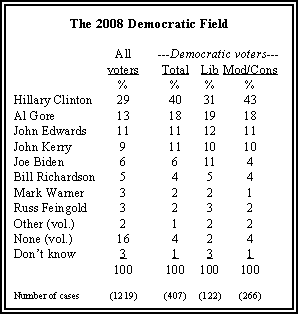 On the Democratic side, Sen. Hillary Clinton continues to hold a sizable advantage. Roughly three-in-ten (29%) voters say they would like to see Clinton win the Democratic nomination, with 13% favoring former vice president Al Gore and 11% backing former senator John Edwards.
On the Democratic side, Sen. Hillary Clinton continues to hold a sizable advantage. Roughly three-in-ten (29%) voters say they would like to see Clinton win the Democratic nomination, with 13% favoring former vice president Al Gore and 11% backing former senator John Edwards.
Clinton’s strength is greater among conservative and moderate Democratic voters than among liberal voters, though she leads by substantial margins among both groups. More than four-in-ten conservative and moderate Democrats say they would like to see Clinton gain the nomination, compared with just 18% who prefer Gore, her closest competitor. By comparison, Clinton holds a 31%-19% over Gore among liberals.
Bush Ratings Stable
Despite significant events overseas, overall impressions of the president’s performance in office have been stable in recent months. Currently, 37% approve of the job Bush is doing, while 54% disapprove, virtually unchanged from surveys in June and July.
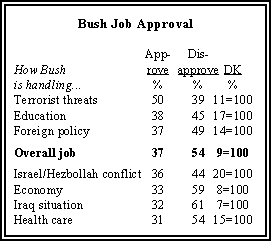 While there continues to be an overwhelming partisan divide in views of the president, independents remain highly critical. By just over two-to-one (59% to 28%) more independents disapprove than approve of the president’s job performance.
While there continues to be an overwhelming partisan divide in views of the president, independents remain highly critical. By just over two-to-one (59% to 28%) more independents disapprove than approve of the president’s job performance.
Handling terrorist threats continues to be the president’s strongest area, and there has been some improvement in public perceptions in recent months. After reaching a low of 42% approval on the issue of terrorism in March, approval rose to 47% in June and up to 50% today. But impressions of the president’s performance in Iraq and on foreign policy remain generally negative. Just 32% approve of how Bush is handling the situation in Iraq, down slightly from 35% in June.
Public evaluations of the president’s personal character also have not changed significantly in recent months. Bush’s first-term image as someone who is trustworthy, capable and a strong leader had already faded substantially by this March, and shows no sign of recovery. By a 52% to 41% margin more say the president is not trustworthy than say he is trustworthy, and the balance of opinion on his ability to get things done, to be a strong leader, and the extent to which he cares about regular people are similarly negative.
 The proportion of Americans who see President Bush as well informed has rebounded from a low in March, during the debate over the possible deal to allow a Dubai-based company to manage U.S. ports. At that time, just 38% described the president as well informed while 54% said he was not well informed. Currently, 46% describe the president as well informed, though an equal number say he is not.
The proportion of Americans who see President Bush as well informed has rebounded from a low in March, during the debate over the possible deal to allow a Dubai-based company to manage U.S. ports. At that time, just 38% described the president as well informed while 54% said he was not well informed. Currently, 46% describe the president as well informed, though an equal number say he is not.
August News Interest
While the public has been closely tracking news about Iraq, Lebanon and the war on terror, this month’s most closely followed story is the high price of gasoline. Six-in-ten Americans followed this story very closely, little changed from June (58%). Public attentiveness to high gas prices reached its peak last September in
the aftermath of Hurricane Katrina, when 71% tracked news about the high price of gas very closely.
There was broad public interest in news that British officials foiled a terrorist plot to blow up jet liners flying to the United States. However, more Republicans (63%) tracked these reports very closely than either Democrats (53%) or independents (49%).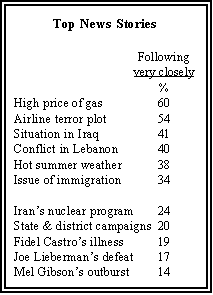
Four-in-ten Americans say they followed news about the conflict in Lebanon very closely. This story has attracted relatively broad interest when compared with other conflicts over the past two decades that did not directly involve the U.S. or Americans. Among such stories, only the Tiananmen Square protests in 1989 and Middle East violence in 2002 drew greater public attention.
Among other stories this month, 38% say they paid very close attention to news about hot summer weather, and 34% closely tracked news about the issue of immigration. Roughly a quarter (24%) say they followed news about Iran’s nuclear program very closely, while 20% say the same about news about state and local election campaigns. That level of interest is on par with recent midterm campaigns.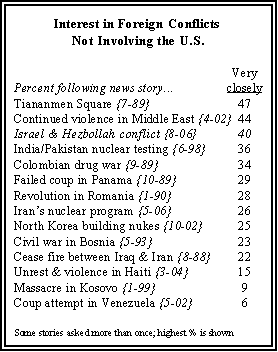
Just 17% of Americans say they followed news of Sen. Joe Lieberman’s primary defeat. Although Lieberman lost in Connecticut’s Democratic primary, this story drew more interest from Republicans than Democrats. About a quarter of Republicans (26%) followed this story very closely, including 36% of conservative Republicans. That compares with 15% of Democrats and 12% of independents.


